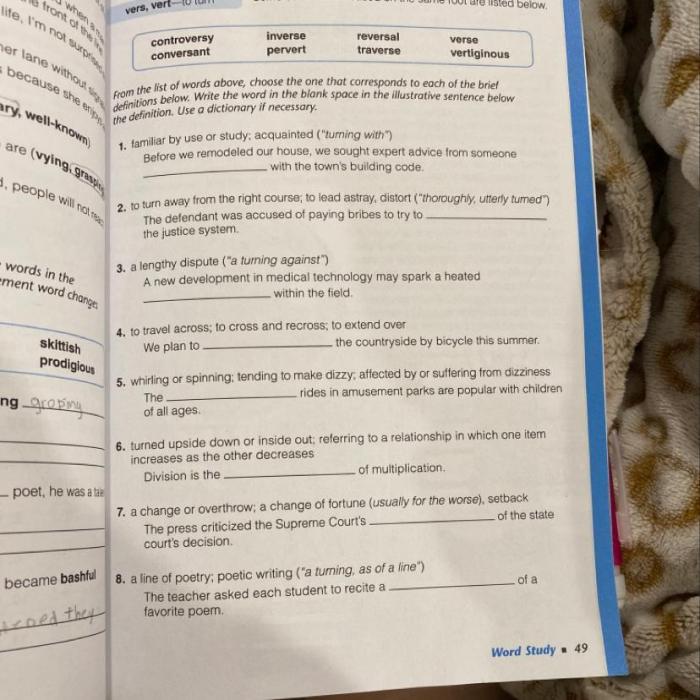Vocabulary workshop level a unit 4 answers – Embark on an exploration of Vocabulary Workshop Level A Unit 4, where the significance of vocabulary development for language learners is elucidated. Delve into a comprehensive analysis of vocabulary exercises, strategies for retention, and an overview of the unit’s key concepts, target vocabulary, and grammar.
This unit delves into the intricacies of the activities, highlighting their role in reinforcing vocabulary acquisition. Suggestions for adapting and extending these activities to cater to diverse learner needs are also provided. Furthermore, the discussion encompasses assessment strategies, providing examples of tasks and explaining their use in evaluating vocabulary knowledge.
Vocabulary Development
Vocabulary development is crucial for language learners as it enhances their ability to express themselves clearly and comprehend spoken and written language. Expanding vocabulary enables learners to engage in more complex conversations, read and understand a wider range of texts, and write with greater accuracy and fluency.
In a workshop setting, vocabulary exercises can take various forms, such as:
- Matching words to their definitions or synonyms
- Creating word maps or concept webs to visualize relationships between words
- Using flashcards to practice vocabulary recall
- Engaging in vocabulary games, such as charades or Pictionary
To improve vocabulary retention, learners can employ strategies such as:
- Regularly reviewing and practicing new vocabulary
- Using vocabulary in context through writing and speaking exercises
- Making connections between new words and existing knowledge
- Spaced repetition, where new vocabulary is reviewed at increasing intervals
Unit 4 Overview

Unit 4 of the Vocabulary Workshop Level A curriculum focuses on expanding learners’ vocabulary related to the theme of “Around the House.”
The target vocabulary words and phrases include:
- Bedroom
- Bathroom
- Kitchen
- Living room
- Furniture
- Appliances
The unit also covers the grammar and usage of these vocabulary items, including prepositions of place, possessive adjectives, and comparative and superlative adjectives.
Activity Analysis
The activities in Unit 4 of the Vocabulary Workshop Level A curriculum are designed to reinforce the target vocabulary through various interactive and engaging tasks.
For example, one activity involves students creating a floor plan of a house and labeling the different rooms and objects using the target vocabulary.
Another activity has students role-playing a conversation between two people discussing the layout and furnishings of a house, incorporating the target vocabulary into their dialogue.
These activities not only provide opportunities for vocabulary practice but also enhance learners’ understanding of the grammar and usage of the target vocabulary.
To adapt or extend these activities to meet the needs of different learners, teachers can consider:
- Providing visual aids, such as pictures or real-life objects, to support learners who may struggle with vocabulary recall
- Offering differentiated tasks, such as allowing learners to choose between writing or speaking activities, to accommodate learners with different strengths and preferences
- Encouraging learners to use their own experiences and knowledge to make the activities more meaningful and relatable
Assessment Strategies
Assessing vocabulary knowledge is essential to track learners’ progress and identify areas for improvement.
Different assessment methods can be used in a workshop setting, such as:
- Vocabulary quizzes or tests
- Writing exercises that require learners to use the target vocabulary in context
- Oral presentations where learners describe a room or object using the target vocabulary
- Self-assessment activities, where learners reflect on their own vocabulary acquisition
By using a variety of assessment strategies, teachers can gain a comprehensive understanding of learners’ vocabulary knowledge and make informed decisions about future instruction.
Lesson Plan Development: Vocabulary Workshop Level A Unit 4 Answers
To develop a lesson plan for a vocabulary workshop based on Unit 4 of the Vocabulary Workshop Level A curriculum, consider the following steps:
- Objectives:Clearly state the learning objectives for the lesson, such as “By the end of this lesson, learners will be able to identify and use vocabulary related to the home.”
- Materials:List the materials needed for the lesson, such as handouts, flashcards, or real-life objects.
- Procedures:Artikel the step-by-step procedures for the lesson, including warm-up activities, vocabulary presentation, practice activities, and assessment tasks.
- Assessment strategies:Describe the assessment strategies that will be used to evaluate learners’ understanding of the target vocabulary.
- Differentiation:Consider how the lesson can be differentiated to meet the needs of all learners, such as providing alternative activities or support for learners who may struggle.
By following these steps, teachers can create engaging and effective lesson plans that promote vocabulary development and enhance learners’ language proficiency.
Answers to Common Questions
What are the key benefits of vocabulary development?
Enhanced communication skills, improved reading comprehension, increased academic performance, and expanded cognitive abilities.
How can I improve my vocabulary retention?
Regular practice, spaced repetition techniques, active recall, and meaningful context.
What types of vocabulary exercises are included in Unit 4?
Matching exercises, fill-in-the-blank tasks, sentence completion activities, and vocabulary games.